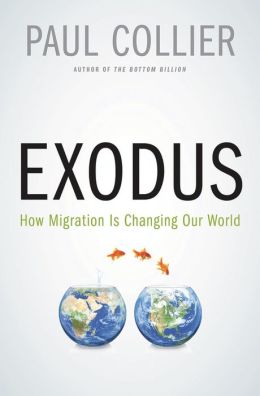In Exodus, Paul Collier lays out the effects of encouraging or restricting migration in the interests of both sending and receiving societies. Drawing on original research and numerous case studies, Collier explores this volatile issue from three unique perspectives: the migrants themselves, the people they leave behind, and the host societies where they relocate. Dalibor Rohac feels this forthcoming book does not fully get to grips with the evidence on untapped economic gains from free migration, but nevertheless this is still a must-read for students of migration.

Immigration is a hotly discussed topic, with emotions and ideology usually trumping a careful reading of data on the actual numbers of those moving across borders. Paul Collier‘s Exodus focuses on the factors that affect people’s decisions to migrate, how immigration affects those left behind, and how it shapes societies in host countries. Collier, a respected development economist at Oxford and former director of research at the World Bank, is not a migration expert per se, and the book does not offer much in terms of new empirical results. Instead, it provides the reader with a simple theoretical model of migration, informed by microeconomic theory, and a review of existing applied research in the area, alongside some rather strong policy claims.
The book is targeted at a general audience but also at those in the policy community who wish to acquire a more systematic understanding of the mechanics of migratory flows and its social and economic effects. Across twelve chapters the book focuses on the effects of immigration on host societies (part two), its implications for migrants themselves (part three) and for their home countries (part four). Finally, the book draws conclusions regarding desirable migration policies in the West (part five).
At the heart of the book lies a simplified model of migration, linking migration to the size of the diaspora: the larger the diaspora, the easier is immigration. Simultaneously, a sizeable diaspora slows down the absorption of immigrants into mainstream society. Consequently, under certain conditions, unrestricted immigration can lead to an explosive growth in immigrants, increasing the diaspora and stalling integration. The effect of an explosive growth in the number of immigrants, discussed in chapter 3, is probably the most important – and most controversial – contribution of the book.
Collier argues that large and culturally distinct diasporas reduce the levels of trust and cooperation in the host societies, citing research by Robert Putnam, a Harvard scholar specialising in the study of social capital. Lower trust levels erode the ability of governments to redistribute income: “despite a growing need for redistributive policies, actual policies have shifted in the opposite direction,” Collier states. But the claim that government redistribution is on the retreat is difficult to reconcile with that fact that, as a fraction of GDP, government spending in the United States is higher than it was in the 1970s. In the United Kingdom, it is roughly at the same level as in 1979.
However that may be, there are differences in how societies absorb immigrants. America, for example, “has been more successful than Europe in integrating immigrants.” While Collier does not scrutinise public policies in order to explain differences in integration of immigrants across countries, he seems to understand the perils of multiculturalism, particularly as it is practiced in the UK. “Multicultural policies have measurable effects such as reduced aptitude of migrants in the national language, which we know reduces willingness to cooperate in public goods provision, and increased spatial segregation.” In other words, “multiculturalism and generous welfare systems slow integration at home and at work.”
What are the effects of migration on migrants and their home countries? Migration occurs because migrants seek a better life for themselves and their families. The gains to immigrants occur because of differences in productivity. The same individuals become more productive – and better paid – when they join better-governed, wealthier societies. Though their personal gains are sizeable, they may come at a psychological cost – separation from family and dislocation to an alien culture.
Migrants leave behind their home societies, which are often plagued by government mismanagement and poverty. Paradoxically, migration provides mechanisms for improving governance in poor places. In 1990, over two thirds of the heads of government of developing countries had studied abroad. Moreover, the exposure to democratic political norms helps transfer these into migrants’ home countries. During the Senegalese election in 2012, Senegalese migrants in the USA and France were calling their relatives frequently, urging them to register to vote and helping them pick the candidates.
Globally, remittances amounted to $400 billion in 2012 – or four times the total aid flows. Here, Collier urges caution; remittances suffer from similar flaws as foreign aid. Although the windfalls make people in poor countries better off, there is very little evidence suggesting that they are effective in improving economic performance of developing countries.
It is a pity that the book does not fully get to grips with the evidence on untapped economic gains from free migration. According to some studies, opening up borders to movement of people could do as much as double the global GDP. “Economics should not be a very important criterion for determining immigration policy,” Collier says, though he is willing to admit that, overall, migration is desirable.
Instead of looking at immigration globally, it is more pertinent to ask whether accelerated migration is desirable, urges Collier. There, he remains a sceptic – mainly because of the limited ability of Western societies to assimilate immigrants. He does not mean the common fear of immigrants driving down wages: indeed, “the effects of migration on the wages of indigenous workers are trivial relative to the fuss that has been made about them.” Rather, he has in mind the effects that migration has on the social fabric of host countries.
The risks that Collier attributes to immigration are thus driven by domestic policies of host countries – specifically, by their overly generous welfare assistance given to immigrants and a misguided notion of multiculturalism. And on that front, the book disappoints. Although the author is correct to advocate a greater integration of diasporas and a legalisation of illegal immigrants as guest workers, he fails to offer a more radical rethink of the West’s redistribution systems. But, as the late economist William Niskanen was fond of saying, cracking the immigration problem will require building a wall around the welfare state, not around our countries.
———————————————–
Dalibor Rohac is a policy analyst at the Center for Global Liberty and Prosperity at the Cato Institute. He tweets at @daliborrohac. Read more reviews by Dalibor.








Just wondering who the ‘our’ in the last paragraph is referring to. Does the author surmise that the article is only read by people from ‘our’ countries?